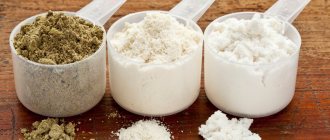How much protein per day should you take?
Every cell in the human body contains protein, so a sufficient daily portion of protein is necessary . In addition to its positive effects on growth and development of strength and muscle mass, proteins also improve hormone production, strengthen the immune system, and promote hair and nail growth. Whether you take protein from animal or plant sources, the amount you need per day depends on many factors. You should also consider your age, weight, physical activity, and your goal —whether you want to lose weight or gain muscle.
Recommended by topic
Banana milkshake with ice cream - TOP 9 different recipes 10 recipes for fruit and berry milkshakes: delicious, healthy and refreshing summer desserts Recipes for milkshakes with oatmeal
What are mycoprotein and spirulina?
Mycoprotein is a protein powder extracted from mushroom protein. It is increasingly called a competent meat replacement. Unlike soy analogs, mycoprotein contains a large amount of fiber, which helps reduce blood cholesterol.
Spirulina is a green or blue powder extracted from seaweed. It is high in fiber and antioxidants, which help speed up the body's detoxification process.
Minimum daily protein intake
Daily protein intake is calculated in grams per kilogram of body weight, starting at 0.8 grams of protein per kilogram of body weight. [1] But such a minimum portion is not suitable for athletes , because the more intensely an athlete trains, the more protein his body requires .
Optimal daily protein intake
Various studies have examined the required daily amount of protein and its effect on the body . Basically, 1.5 g of protein per 1 kg of weight . Only a few studies have examined higher protein intakes of approximately 2.2 to 3.3 g/kg . However, not a single study has revealed a negative effect of protein on human health . [17] In the table below you will find the basic breakdown of daily protein intake according to the main factors . [10]
At a healthy weight
| Way of living | Weight maintenance | Muscle growth | Weight loss |
| Passive lifestyle | 1.2–1.8 g/kg | 1.2–1.8 g/kg | 1.2–1.8 g/kg |
| Active lifestyle | 1.4–2.0 g/kg | 1.4–2.4 g/kg | 1.6–2.4 g/kg |
If you are overweight
| Way of living | Weight maintenance | Muscle growth | Weight loss |
| Passive lifestyle | 1.2–1.5 g/kg | Not applicable | 1,2–1.5 g/kg |
| Active lifestyle | 1.2–1.5 g/kg | 1.4–2 g/kg | 1.4–2 g/kg |
Optimal daily protein intake for muscle growth
The combination of intense training and the right amount of protein is the golden path to success . Below we have provided a table of correct protein intake , based on body weight and suitable for both women and men .
| Weight | Minimum portion | Maximum portion |
| 45 kg | 63 g | 150 g |
| 57 kg | 80 g | 187 g |
| 68 kg | 95 g | 225 g |
| 79 kg | 111 g | 262 g |
| 91 kg | 127 g | 299 g |
| 102 kg | 143 g | 337 g |
| 113 kg | 158 g | 374 g |
| 125 kg | 175 g | 412 g |
Based on the table, we can see that athletes and active adults can minimize body fat gain by increasing their protein intake to 3.3 grams per kilogram of body weight. [10] Thus, a healthy adult athlete who wants to achieve muscle growth and currently weighs 200 pounds could consume up to 299 grams of protein per day.
Research has shown that if you gradually challenge your body during exercise and eat a hypercaloric diet (consuming an additional 370-800 kcal), you will lose more fat if you take 3.3 g/kg protein than if you take 1.8 – 2.6 g/kg. [18] [19] It should be noted that the maximum portion of protein will not help build more muscle than the minimum portion. However, it can minimize your intake of fat from your diet , which will help you shed those extra pounds. Also remember that your daily protein intake should be based on body weight, not calorie intake . Calorie intake, on the other hand, should be based on your weight and the goals you set for yourself.
How to dilute protein with water
Many people are interested in what is better protein with milk or water ? If you don’t have milk with you or have an intolerance to it, then you can use plain water, compote or juice for dilution. Water should be chosen by those who are trying to reduce their daily caloric intake and by athletes who are cutting; this option is also more budget-friendly.
How to properly dilute protein ? Pour water into a shaker or glass, add the required amount of protein and shake well.
Protein made with water is less tasty, but lower in calories. Instead of plain water, it is allowed to use carbonated unsweetened water, mineral or any other, as long as it is boiled, filtered or purchased.
Can protein be diluted with hot water ? Diluting protein with hot water is prohibited, since proteins coagulate under the influence of high temperatures, in addition to which the amount of useful substances decreases.
In what water should the protein be diluted, warm or cold ? It is best to dilute in warm water, since in cold water the mixture may not mix well and the cocktail will contain lumps.
Optimal daily protein intake for weight loss
One previous study found that athletes should consume about 1.8–2.7 grams of protein per kilogram of body weight . [20] However, recent research suggests that in order to minimize muscle loss during dieting, athletes should consume 2.3 to 3.1 g of protein per kilogram of body weight . [21] This value is also confirmed by the International Society of Sports Nutrition. [22] The recommendation, however, only applies to relatively slim people who are trying to shape and strengthen their figure. Some studies have shown that a serving of 1.2-1.5 g/kg is appropriate obese to maximize fat loss. [23] [24] [25] The European Association for the Study of Obesity protein intake for obese adults . [26]
Given the health risks associated with overweight and obesity , it is also interesting that consuming high-protein diets (about 27% of daily caloric intake) may reduce cardiometabolic risk factors , including blood pressure or triglyceride levels, and may also help increase HDL cholesterol levels . But it is worth recognizing that these effects were observed only in small quantities. [27]
In the table below you will find the daily protein intake for healthy adults and overweight people. The values are broken down by body weight in kilograms. [10]
For overweight and obesity
| Weight | Minimum portion | Maximum portion |
| 45 kg | 54 g | 68 g |
| 57 kg | 68 g | 85 g |
| 68 kg | 82 g | 102 g |
| 79 kg | 95 g | 119 g |
| 91 kg | 109 g | 136 g |
| 102 kg | 122 g | 153 g |
| 113 kg | 136 g | 170 g |
| 125 kg | 150 g | 187 g |
At a healthy weight
| Weight | Minimum portion | Maximum portion |
| 45 kg | 100 g | 150 g |
| 57 kg | 125 g | 187 g |
| 68 kg | 150 g | 225 g |
| 79 kg | 175 g | 262 g |
| 91 kg | 200 g | 299 g |
| 102 kg | 225 g | 337 g |
| 113 kg | 249 g | 374 g |
| 125 kg | 274 g | 412 g |
Remember that calculating your daily protein intake is based on your actual body weight , not the ideal weight you want to achieve. Therefore, if you are on a diet and want to reduce body fat as much as possible without losing muscle mass, you need to take 2.3 – 3.1 g/kg of protein per day . People who are overweight or obese need to take 1.2-1.5 g/kg protein throughout the day. [10]
Diet for weight loss
When it comes to losing weight, the first thing you need to do is:
- Divide your diet correctly - 4-5 meals, including the first at 7-9 in the morning, and the last no later than 2 hours before bedtime.
- Replace the first and last meals completely or partially with protein drinks. These can be cocktails with milk, low-fat ice cream, eggs, cottage cheese and fruits and other ingredients. All ingredients must be mixed in a blender, adding 50-60 grams of protein.
- From the remaining meals, it is best to completely exclude all sweet and starchy foods.
Otherwise, the diet is quite simple. The main rule is to follow the recommended amount of carbohydrates per day - 150-200 grams.
Can proteins be harmful?
You may have heard the myth that proteins damage the kidneys , cause liver failure or osteoporosis. The fact is that this statement has not been confirmed by any research , and there is no evidence of the negative effects of protein in the body of healthy people . [4] Of course, if you have kidney or liver problems, you should consult your doctor before taking protein supplements.
How much protein should you take after a workout?
Numerous studies have been conducted on how much protein you should take per serving. Older studies agree that 20-25 grams of high-quality protein is sufficient to maximize protein stimulation in muscles. [12] [13] [14] However, newer studies have questioned this result. They cite that previous studies did not take into account the amount of pure muscle mass. Thus, an individual with a higher proportion of pure muscle mass requires a higher proportion of amino acids to maximize muscle growth and regeneration after exercise. These studies conclude that muscle protein synthesis is increased by consuming 40 grams of whey protein after exercise. [5]
In any case, more research is needed for scientists to know the most appropriate amount of protein per serving As a result of studies that showed an optimal serving of 20-25 g , a study was conducted on a group of people who trained only their legs . While the studies that showed the ideal 40g serving were based on a group of people who did full-body circuit training . Therefore, the indicators of these studies are not consistent with each other. Also, do not forget that increased muscle activity during training requires more amino acids and protein for recovery. [eleven]
At the same time, muscle tissue requires about 25-30% of total protein intake. This means that consuming more protein does not necessarily stimulate muscle growth . For example, taking a 70g serving of protein will have the same effect on muscle growth as eating a 40g serving of protein. However, increasing your protein intake does not mean you are wasting it. [6] [15] The body stores protein as an energy source for further training. [9]
Also, during the same study, scientists received different results, since protein intake for each person depends on individual needs . For example, age, weight, training intensity, sports goals and fitness level. Regardless of how much a single serving of protein is (20 or 40 g) , it is important to divide your protein intake throughout the day - up to 5 times.
This will help to constantly stimulate protein synthesis in the body. [8]
A little eyeliner
The easiest way to achieve your goal is proteins in jars.
Protein powder is becoming more accessible: it can be found in sports nutrition stores, online stores and popular marketplaces (like Iherb or Ozon). There are whey and egg proteins.
It's worth noting that alcohol negates the beneficial effects of protein, so it's best to limit your drinking on the road to a great athletic future.
The rate of digestible protein is calculated for each person individually, based on weight and intensity of physical activity. Approximate values, of course, can be obtained using reference books and calculators, but in this case it is better to consult a specialist so as not to suffer a blow to the kidneys.
Yes, exceeding the norm of protein consumption can cause serious stress on the kidneys, so it is important to drink a lot of water, follow a training regimen and carefully monitor your own well-being.
When is the best time to take protein?
Timing your protein intake is just as important as getting the right daily portion . As stated earlier, this depends on your fitness goals and current weight. Athletes need to regularly receive proteins throughout the day, in the amount of 20-40 g . An effective solution is a combination of the right protein and time . It is optimal to divide the intake into 5 stages - morning, afternoon, evening, before training and after training.
In the morning
Research shows that the body is most sensitive to the effects of amino acids from protein 24 hours after exercise. [36] High quality, fast-absorbing whey protein is a great way to start your day and is ideal for muscles. However, if you want to completely replace your breakfast with protein, then it is better to use casein . [37]
During the day
To get the desired amount of protein per day, it is advisable a protein shake , bars or other protein snacks as a snack Supplementing with protein can also be done through a protein drink or natural protein sources.
In the evening, before bed
A protein shake before bed can be very effective for burning fat , as well as increasing strength and muscle mass . In this case, the best choice is caseins, also called overnight proteins, which are slowly absorbed, providing protein to your muscles while you sleep. [33] [34] [35]
Before training
When you drink a protein drink before your workout, you will get the same benefits as when you drink it after your workout. [32] Fast-absorbing protein will help you rebuild muscle fibers during your workout. Whey protein is best for pre-workout consumption .
At the same time, an excellent alternative to protein before training is BCAA (leucine, isoleucine, valine). Leucine is an essential amino acid that has the ability to stimulate cells responsible for muscle growth. [2] BCAA in soluble form should be taken 15 minutes before training, in tablet form 35 - 40 minutes before training.
After training
There is no exact time at which you need to consume protein after a workout, but there is such a thing as an anabolic window , which takes 30-45 minutes after a workout , so it is best to consume protein at this time. [16] But even if you take a portion of protein later, this will also provide the necessary result . In any case, it is necessary to take a dose of protein after training to give the muscles the amino acids necessary for growth and regeneration . [28] [29] [30] [31] When choosing an appropriate post-workout protein, remember that the rate of absorption depends on the type of processing of the particular protein.
How to dilute protein
Manufacturers recommend making cocktails with protein using a shaker, which is capable of mixing the additive particles as efficiently as possible without leaving lumps; to do this, pour liquid into a jar and add the additive, close the lid and shake until a homogeneous mass is formed.
How to dilute protein with water in a shaker ? The shaker is a convenient measuring device
a glass with a lid and a closing hole through which the product can be poured into a glass or drunk from it. The shaker allows you to dilute the protein mixture without a single lump, even in water. After all the components are placed in the vessel, close the lid well and shake the shaker until the powder is completely mixed.
How to stir protein without a shaker ? If you don’t have a shaker, you can mix the protein with liquid using other devices. To do this, you need to find a container with high sides, a whisk, fork or blender. After mixing the ingredients using one of the selected items in a container, beat the egg white mixture.










